
Describe Yourself in Three Literary Characters
Last week, a trend of describing yourself on social media with photos of three fictional characters went viral. My Facebook and Twitter feeds were inundated with people playing into the meme and it was really fun to see what characters people use to describe themselves.
I thought it would be cool to have Book Riot contributors do the same, but with literary characters. I think most contributors really enjoyed coming up with their picks – but some of them confessed to full-fledged identity crises and mulling over their choices for a long time. Discussions on why many of us chose characters from book series that impacted our childhoods were also fascinating: have we stopped growing and are we stuck or is it that we no longer spent enough time with characters we love?
Basically I found this to be a great mental exercise and recommend that you pick your own characters in the comments. And if you’re curious about what characters define Book Riot contributors, our picks are below!
Matilda, of Roald Dahl’s Matilda, describes my love for books and for magic, or as I call it, sociology. Always inquisitive and curious, Matilda inspired me to look at things differently and find the magic in them. Lenú from Elena Ferrante’s Neapolitan Series perfectly describes the day-to-day struggles of being a woman and wanting to be successful and intelligent. Ifemelu from Chimamanda Ngozi Adichie’s Americanah because of her immigrant experience and her need to delve into daily issues deeply through writing.
These might be deep dives, but I promise that they are accurate. Jane Standen, the museum professional and archivist at the center of Aislinn Hunter’s incredible The World Before Us. This book, narrated by “a chorus of ghosts” captures the experience of becoming immersed in a research project. Maeve Kerrigan, a London police woman at the center of Jane Casey’s series of mysteries, is a lot tougher and smarter than I am. Still, she’s who I’d like to be: tough, competent, kind, a bit damaged, and really good at solving a puzzle (well, crime). Finally, Moist von Lipwig, the unfortunately named postmaster in Terry Pratchett’s Going Postal (Discworld 33), because I’m obsessed with the Postal Service even when it doesn’t run as smoothly as it could (seriously, I have a postage stamp tattoo).
Hermione Granger because I have always believed that the answers to everything lie in books. Also, I’m an insufferable know-it-all but I usually use my knowledge for good. The Big O from Shel Silverstein’s The Missing Piece Meets the Big O because I’ve been told that’s how my friends think of me. I try to encourage people to be their best selves and that everyone is a complete person on their own, whether they are in a relationship or not. Mr. Vandemar from Neil Gaiman’s Neverwhere because if there is mischief going on, I’m usually the brains (and the talker) and not the muscle. I’ve both talked myself into trouble and back out of it more than once; I can be pretty persuasive, so I’ve been told.
Luna Lovegood–-because I am more often than not spacey and in my own world and, frankly, I don’t think that’s a bad thing.
Frankie Landau-Banks aka my personal hero. She’s the take-no-prisoners-social-justice-feminist-pranking-mastermind I could only ever aspire to be.
Harriet (of Harriet The Spy)﹘I love to know everybody’s business but only if I can hunker down with a journal and not have to actually talk to anybody.
Luna Lovegood (from Harry Potter)- Her whimsy and lack of concern that people find her odd, but also her awareness that people find her odd.
Leah Price (from The Poisonwood Bible) – She’s devoted to her family and intent on pleasing her parents when she’s a kid, idolizes her father. When she grows up she realizes that their ideals are flawed. I have always related to her ability to do as she pleases and to really think about her decisions in life, regardless of how her family views them. Plus, Leah’s my middle name!
Mary Russell (from Laurie R King’s Mary Russell/Sherlock Holmes series) – A bit tomboy, whip smart, uncompromising about her very specific interests. Has opinions about religion.
Pnin from the Vladimir Nabokov novel of the same name because I, too, am a bumbling former academic that no one takes seriously. The Underground Man from Dostoevsky’s Notes from Underground because I have a tendency to sit alone at home feeling disgruntled. And, finally, Tristran Thorn from Neil Gaiman’s Stardust because I totally sympathize with the idea of going on quest for something and realizing at the end that I want something else entirely.
Neville Longbottom from Harry Potter describes my desire to be the best version of myself everyday, despite my own internal doubts and fears. Oracle from Birds of Prey exemplifies by belief that information is the greatest weapon one can wield. Sera from Angela: Queen of Hel reflects my own tendency to use humor and sarcasm to both disarm and deflect.
Jo March from Little Women: Like her, I am impatient, ambitious and somehow a mix of dramatic and practical. Also like her, I find sustenance in literature.
Elizabeth Bennet from Pride and Prejudice: I am stubborn, opinionated and often make up my mind about a person quickly and out of vanity, refusing to change it until I’m slapped upside the head with evidence that, oh hey, maybe I’m not such a good judge of character after all.
Peter Pan from, you guessed it, Peter Pan. I have a hard time with change. I haven’t actually escaped to Neverland, but I retreat into my own inner version more often than I care to admit.
Although I’m not always as spunky as Anne of Green Gables, I feel like she really represents my undying romanticism (floating down a river to reenact a tragic poem? I would totally do that) and obsession with book-learning and doing well in school. Also, Gilbert Blythe is my dream man. In a completely different way, I think Esther Greenwood from Sylvia Plath’s The Bell Jar represents all the potential darkness in me, but also an ability to find humour amidst the darkness. And last but not least, I’d be amiss not to say Hermione Granger, even though lots have already claimed her. She’s an awkward bookish girl with bravery hidden underneath, which is pretty much me to a tee.
Every girl who loves books relates to Harry Potter’s Hermione Granger on some level – book-loving, absolutely in love with the magical world given to her, and utterly loyal to her friends. I love her and relate to her for the same reasons I relate to Wicked’s Elphaba – though there’s no denying that I prefer her musical incarnation over her book incarnation. Then there’s Rhiannon from T.A. Barron’s The Lost Years of Merlin series, a girl who loves her magical world, her tree, her creatures, her people, and who longs for nothing more than a set of wings. She was me as a child, everything I wanted to be, and she’s still a huge part of me.
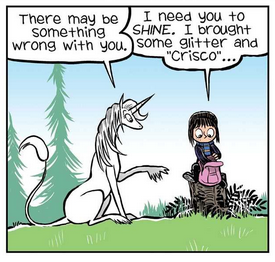 Phoebe’s wish upon meeting a unicorn is making it her best friend. I’m a grown adult and this would still be my wish so I often find myself nodding my head along while reading Phoebe and Her Unicorn.
Phoebe’s wish upon meeting a unicorn is making it her best friend. I’m a grown adult and this would still be my wish so I often find myself nodding my head along while reading Phoebe and Her Unicorn.
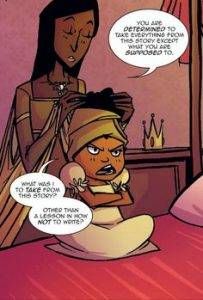 Princess Adrienne in Princeless immediately finds plot holes in the stories her mother reads her and takes issue with the idea of girls/women waiting in towers to be rescued by Princes. She saves her own damn self and goes on a quest.
Princess Adrienne in Princeless immediately finds plot holes in the stories her mother reads her and takes issue with the idea of girls/women waiting in towers to be rescued by Princes. She saves her own damn self and goes on a quest.
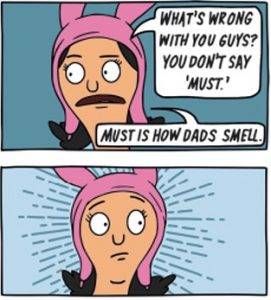 Louise Belcher (there’s a comic now so I’m counting it!). She wears bunny ears, aggressively defends herself, is snarky, sarcastic, ingenious when it comes to plans that aren’t necessary, but at the end of the day always does the right thing.
Louise Belcher (there’s a comic now so I’m counting it!). She wears bunny ears, aggressively defends herself, is snarky, sarcastic, ingenious when it comes to plans that aren’t necessary, but at the end of the day always does the right thing.
I’m going to describe myself as Elinor Dashwood, from Sense and Sensibility, because I’m a big sister, I spend more time listening to my head than my heart, and I’m very good at keeping secrets. Next, I’ll say I’m like Toad from Arnold Lobel’s Frog and Toad series. I’m a big worrier and losing my to-do list will definitely ruin my day. Finally, I’ll pick Cassandra Mortmain, from I Capture the Castle, because I’m also an aspiring novelist and spend an inordinate amount of time writing in my diary.
Kristy Thomas from The Babysitters Club has always been my bossy, loudmouthed, big-idea-having patron saint, while Alanna of Trebond from Tamora Pierce’s Song of the Lioness Quartet is more of an aspirational pick. My deep cut is Salem Brownmiller from Jerry Spinelli’s mostly-forgotten School Daze series – a motormouthed oddball with a big dream who’s constantly writing stories.
Morgaine from The Mists of Avalon. She’s stronger than she knows, kind of an outsider, can be kind of a bitch sometimes, and can take care of herself, thank you. Second, I’d pick Ayla from Jean Auel’s Earth’s Children series. I always loved her self-reliance and strength, and her ability to adapt to new situations. Finally, though I make no claims to be as smart by any stretch as he is, I’d choose Sherlock Holmes. I’m super logical, usually have little patience for other humans, prefer my own company, and almost always miss social cues. I don’t know if this is a good or bad character to identify with, but I do!
First up, Fanny Price from Mansfield Park. I really relate to Fanny’s shyness and desire to keep the peace, as well as her tendency towards sensitivity. Second, Mia Thermopolis from The Princess Diaries. She’s overly dramatic and often overlooked, but she always tries to do the right thing (even if she sometimes fails miserably). Even though she’s a princess, she’s often focused on love and romance, as is the sappy core of my cold, bitter heart. Finally, Tibby Tomko-Rollins from The Sisterhood of Traveling Pants. Tibby’s sarcasm and independent attitude always calls out to me when I read this series and watch the films. Even if I’m not always as outspoken about my snark, I’m usually thinking it.
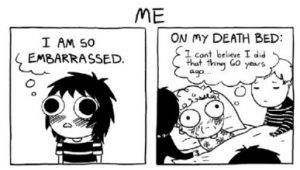 The protag from Sarah Andersen’s comics Adulthood is a Myth, for her awkwardness, love for books and solitude, and constant feeling of not really belonging to the adult world.
The protag from Sarah Andersen’s comics Adulthood is a Myth, for her awkwardness, love for books and solitude, and constant feeling of not really belonging to the adult world.
Meggie Folchart from the Inkheart trilogy for her (surprise, surprise!) bookishness. Meggie was the first bookworm I encountered in a book as a child, and her fascination for reading, and the fact that she took books with her everywhere, meant everything to me. And OF COURSE, I wanted her ability to bring books to life.
Anne from Enid Blyton’s Famous Five series, because even as a child, the five kids’ adventures, however fun to read, would also give me a bit of anxiety– oh my goodness, why would you go into abandoned buildings and castles and talk to gypsies in travelling circuses; don’t do that, guys!
My social media version of this meme included two television characters (Bernard Black and Ethel Mertz) and Morticia Addams, who I could argue is a literary character since I used the Charles Addams version, but… I wanted to do a true literary interpretation. I realized that I don’t have to look any further than Harriet the Spy for my characters: Harriet, Sport, and Sport’s dad. I am insatiably curious and a loner, like Harriet; a caregiver like Sport; and a (sometimes) depressed writer like Sport’s dad.
Like Bridget Jones, my love life continues to spiral downwards into the absurd ever since I devoured the first novel at age fourteen and have returned to it many times since. To me, Bridget is the ultimate hot mess, a quality I definitely share as I stumble towards my thirties bolstered by friendships, awkward encounters with men, and an endless struggle with my weight. Bridget always manages to make it through somehow, armed with a sense of humor and generally good intentions. I only wish I were better disciplined at keeping my journal. Elizabeth Bennet and I share a haughty pride and sass, as well as sometimes getting carried away with my mouth. I can be just as judgemental as she is, for better or worse, and don’t know how to handle encounters with men who have a thing for me. Still waiting on my Mr. Darcy, though… Like Richard Papen of The Secret History, I have been both on the fringe and deeply involved in cult-like friendships and groups of tight-knit intellectuals. Likewise, I have felt as if I were an outsider running up against prestige of the best and the brightest. And I have always had an Achilles heel for the picturesque and can use romanticism as a way of rationalizing just about anything. Except murder, that is…
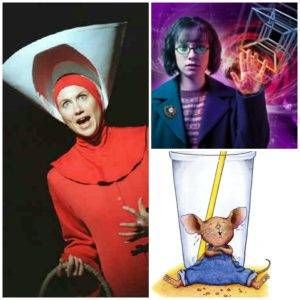
Offred (“The Narrator”) in The Handmaid’s Tale. I feel like no matter how much I tell people, they never really get to know me. They know facts, but they don’t know me. That’s how I feel about Offred (even though that’s not her name). She tells us this incredibly personal account of the life that she lives as a handmaid, but we never really know her. We have some information about who she used to be, but those are just details and they make little impact in the context that we are given.
Meg Murry from A Wrinkle in Time. I’m not going to look ahead at what her life turns to in later books, but the Meg Murry in her first published appearance is a girl that I can really identify with. She’s protective of and loyal to her siblings. She forms fast friendships that are true and that last. I’d like to think that I could say the same about myself.
The Mouse from If You Give a Mouse a Cookie. I, too, will always ask for a glass of milk.
First, and perhaps foremost, Anne Shirley, from Anne of Green Gables et. al., whose sparkling imagination, love of stories, and desire to love and help others mirrors me. Second, Professor Minerva McGonagall. I tend to have a very no-nonsense attitude when it comes to teaching my students. I’m strict, but I try to always be fair, and I know that if I set the bar very high, students always rise to the occasion. Also, I give some pretty scorching looks when the occasion calls for it. Finally, I’d have to say Lizzy Bennet from Pride and Prejudice. I love to be lively when the occasion calls for it, and I can be stubborn too!





